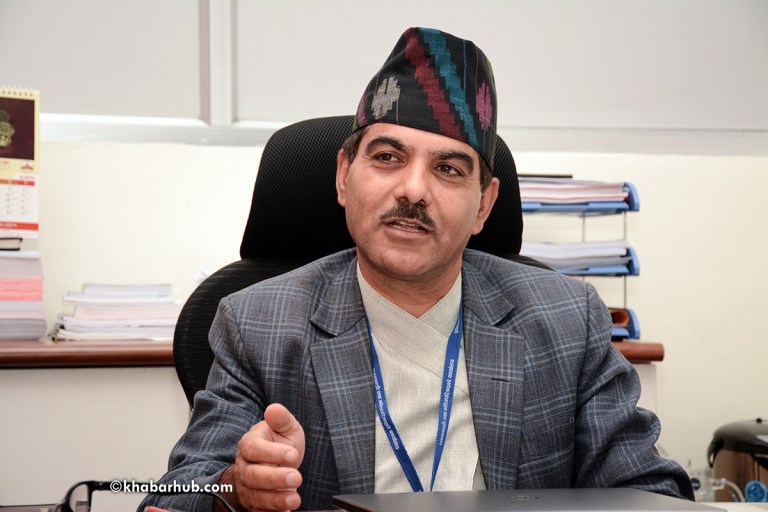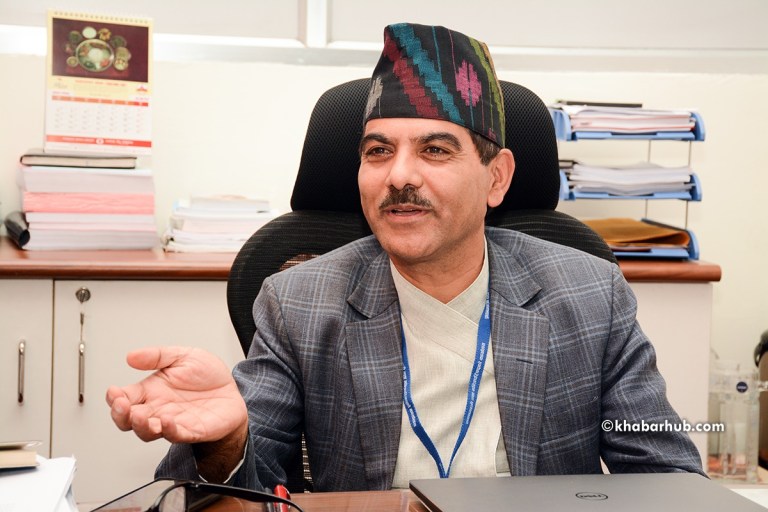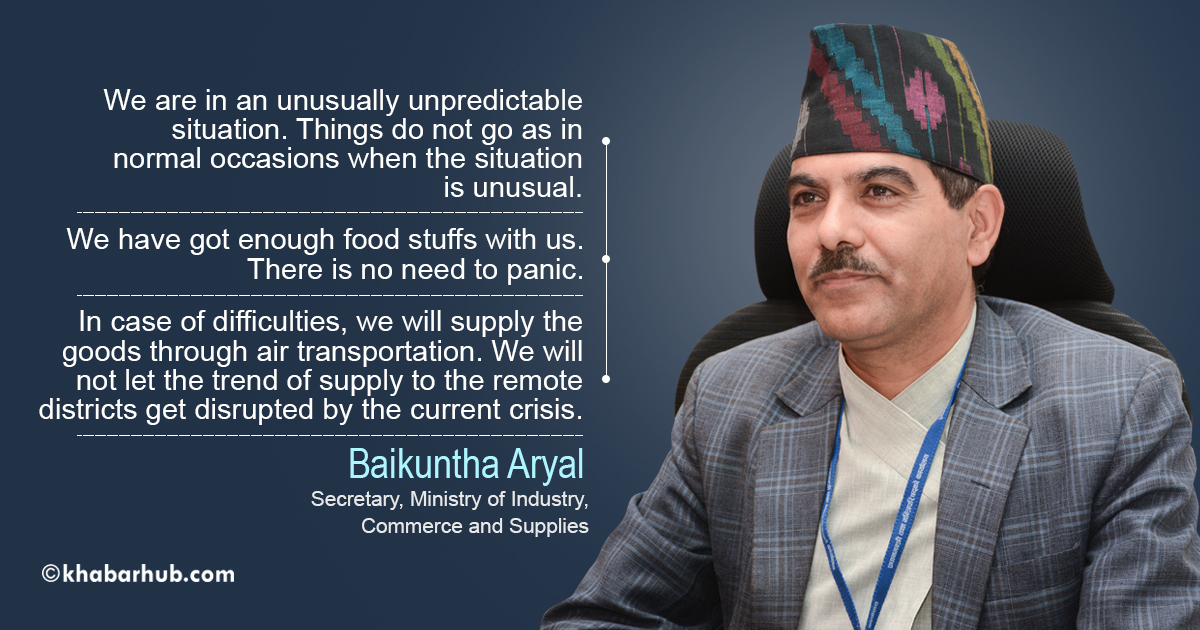KATHMANDU: The government has enforced lockdown as a measure to curb all spreading COVID-19. The people are wondering about the stock and supply of the daily goods of consumption. The farmers are also worried about the market for their goods and food for their cattle.
In this regard, Khabarhub has talked to Baikuntha Aryal, the Secretary at the Ministry of Industry, Commerce and Supply to share about what the government has been doing to address such queries of all people. Here are the excerpts of the interview:
What has the government done to ensure the smooth supply of the goods during the lockdown?
We have been updating the statistics now. Updating the data helps us know the exact condition of supply, storage, and requirement at each center. We have been updating and analyzing the status of the food supply in coordination with local levels.

Our main concern now is the food supply. To make it convenient for the consumers, we have arranged to supply it through the government companies. We are working closely with the Food Management and Trading Company, Salt Trading Corporation, the industrialists, entrepreneurs and businessmen.
We have been striving not to let anything disrupt the food supply chain. We have facilitated the market in many ways. Small and big shops are also kept open at designated times. The departmental stores have started a home delivery service as well.
When the sale goes up, the stock is sure to decrease. We have been facilitating to supply the most essential goods to the retailers.
Government companies have also tried to supply the most essential goods. But many consumers complain that the consumers don’t have access to it. How are you addressing such complaints?
Yes, we have got some complaints. We are in an unusually unpredictable situation. Things do not go as on normal occasions when the situation is unusual. We cannot expect everything as on normal occasions. People can buy things from the local shops as well.
If they have to reach a bit further, they should consult the security forces.
When the lockdown goes extended, the stock of most essential goods may get cleared. How has the Ministry arranged it?
Surely, there may be a scarcity of goods and supplies. The industries are shut down. When the factories or industries are shut down, there may be scarcity.
Adopting all precautionary measures, the government has decided to let the factories producing the most essential goods and supplies operate during the lockdown as well. If we are able to run the rice mill, there won’t be a scarcity of rice.
If we are unable to run the factories and industries and if the workers are not able to go to the factories, the problems may arise. Our ministry has been working closely with the local government and the Ministry of Home Affairs to address such problems.
The problems may arise in the foodstuffs. We have got enough foodstuffs with us. There is no need to panic. The challenge is in supply. We may not get enough manpower to take things from one place to another; however, we have been trying to address the problem in coordination with the industrialist, businessmen, and retailers.
Farmers have been complaining about supply problems. The vegetables are rotting, The dairy farmers, poultry farmers, fish farmers are complaining about the difficulty in the supply of fodder. What do you say about it?
Actually, no pass is required for the vehicles used in the transportation of vegetables, fruits, water, milk, fodder, and farm products. Such things can be transported from one place to another without any restriction.

The problem here lies in the means of transportation. There are not enough means of transportation. This might have caused some problems. We have worked in collaboration with the local government, Ministry of Home Affairs, Kalimati Vegetable and Fruits Development Committee to explore some way out in this regard as well. We have been seeking small farmer cooperatives’ support in this regard as well. We are working on all possibilities. Every farmer need not take their production to Kalimati.
We are planning to expand the collection centers which will collect from the producers and suppliers to the retailers and the consumers directly. If it’s done by the local level, it will be more effective.
How are you planning to supply the foodstuffs in remote areas as in the areas of Far Western Provinces, where people have to walk for many days for food?
We have thought about them as well. There are depots of Food and Trading Company in remote districts. We have got 21,982 metric tons of rice with Food and Trading Company. 4000 metric tons are in stock in those areas.
In case of difficulties, we will supply the goods through air transportation. We will not let the trend of supply to the remote districts get disrupted by the current crisis. We will follow the good practices of the past.
The lockdown period is extended. Has the Ministry assessed the potential problems that may arise due to the imbalance between the import and supply of the goods?
Naturally, when the lockdown period is extended, there will be more challenges ahead in import and supply of goods. The lockdown is not confined to our country alone, one of our main major suppliers India is also in lockdown.
We have got the advantage of the border with China. The border to China is open and from some of the border points in the North, we have started importing goods. Yet, most of the goods are imported from India.
We have got enough stocks for four months. If we are able to revitalize the internal system by then, we won’t be in much trouble. We plan to collaborate with cooperatives in this regard.
What about the difficulties related to medicines. The suppliers here say they experience difficulties in importing medicines for some sorts of chronic illnesses. What arrangement have you made in this regard?
There is no big problem with the import of medicine. The raw materials are also made available on a regular basis. Earlier India had levied restriction on the export of 26 medicines, but now it has waived the restriction off except on paracetamol.
We have been checking the storage of such goods with us. The production over here is going on uninterrupted. We have enough raw materials.
We have the stock for nearly 7 months. If anyone is talking about some specific medicines, we can facilitate it.
What do you think the local level can do in such an adverse situation?
Local levels have also got a chance to prove their excellence. They can establish their role by their role and responsibility. They are working very actively. The local representatives are working very actively.
There might have been some lapses in the execution of duties and responsibilities, but they have been changing themselves learning from the good practices of others. Together we all can make a difference, a substantive difference at this moment.
What are the lessons learned from the outbreak of this pandemic? What has the Ministry learned about the lapses in the supply system, storage capacity and the functioning of the government itself?
Frankly speaking, it has taught us a lot. We were not prepared for this situation. Now we have learned that we have to keep our supply chain, storage capacity and the assessment intact.
Storage capacity enhancement is a must. Had we got a better capacity, we could have faced such a situation much longer. Had we been able to store more fruits, we would not have felt much pressure.
The internal supply system also deserves a thorough revision. The goods of Mechi should reach to Mahakali and vice versa. There should be a natural like inflow and outflow of goods and supplies from and to the hills and terai. We have realized that we have to improve our transportation system.
We have products in one place but are unable to take it to another part where it has high demand, and the product is rotting not getting the market.
We have learned that we have to improve our distribution system as well.
I am impressed with the way people are cooperating. I thank all for the cooperation.
This is an unusual situation. We may need to make compromises. It will be a little bit inconvenient. This is a common problem of producer, supplier and consumers all. We had never been such a situation before.
I want to reiterate that there won’t be a scarcity of food supply. There is no need to panic. We have to be alert and stay safe.









Comment